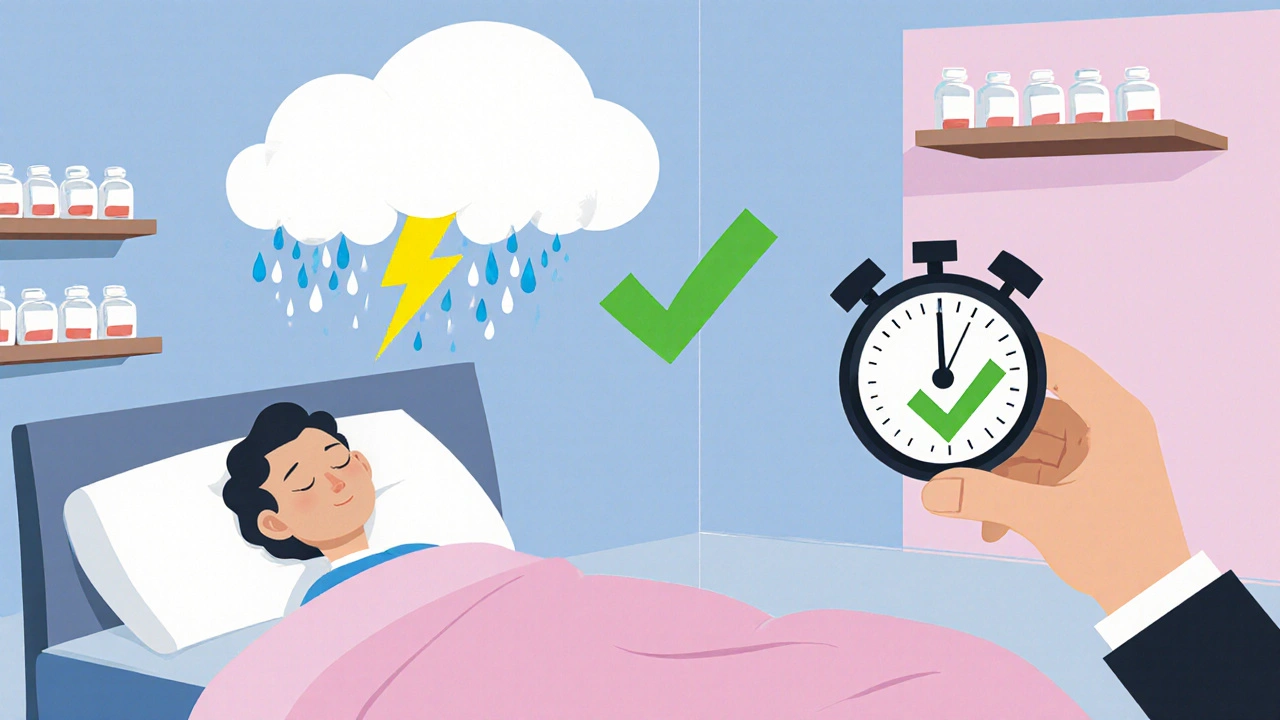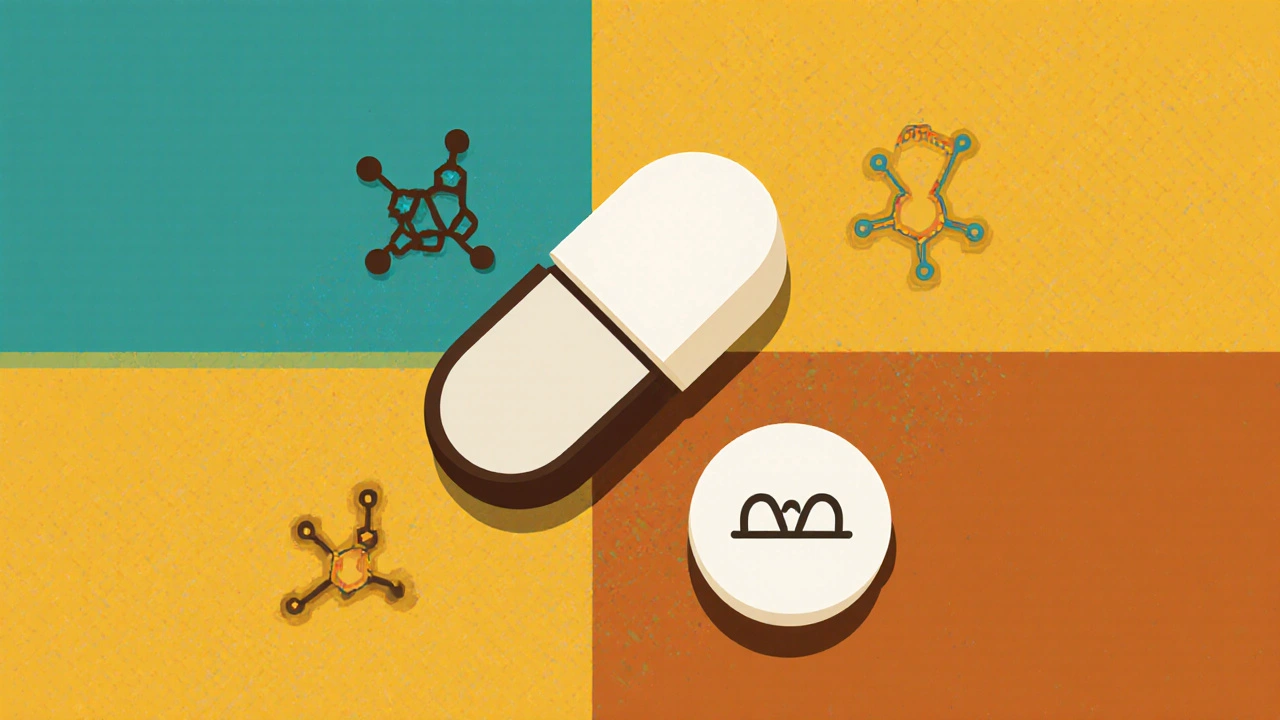Serotonin Syndrome Risk Calculator
When you're fighting a serious infection like MRSA or VRE, linezolid can be a lifesaver. It's one of the few antibiotics that still work when others fail. But if you're also taking an antidepressant-say, sertraline, fluoxetine, or venlafaxine-you might have heard a warning: linezolid could cause serotonin syndrome. It sounds scary. And for years, doctors were told to avoid combining them at all costs. But here's the twist: the real risk might be much smaller than you think.
What Is Linezolid, Really?
Linezolid, sold under the brand name Zyvox, is an antibiotic approved by the FDA in 2000. It doesn't work like penicillin or ciprofloxacin. Instead, it blocks bacteria from making proteins by sticking to their ribosomes. This makes it especially useful against drug-resistant infections like MRSA and VRE-bugs that laugh at most other antibiotics.
But here’s the odd part: linezolid was originally discovered as a potential antidepressant. That’s because it weakly blocks monoamine oxidase (MAO), the enzyme that breaks down serotonin, dopamine, and norepinephrine in the brain. Classical MAO inhibitors like phenelzine are powerful, with strong effects on mood-and serious dietary restrictions. Linezolid? It’s about 100 times weaker. Its IC50 for MAO-A is around 40-50 μM, compared to less than 1 μM for phenelzine. That’s why you don’t need to avoid aged cheese or red wine with linezolid like you do with older MAO inhibitors.
What Is Serotonin Syndrome?
Serotonin syndrome isn’t just feeling a little “wired.” It’s a medical emergency. It happens when too much serotonin builds up in your nervous system. Symptoms come in three groups:
- Cognitive: Agitation, confusion, hallucinations
- Autonomic: Sweating, fast heartbeat, high blood pressure, fever
- Neuromuscular: Shaking, muscle stiffness, overactive reflexes, twitching
In severe cases, it can lead to seizures, kidney failure, or even death. But these extreme outcomes are rare. Most cases are mild and resolve quickly once the trigger is stopped.
The classic cause? Combining two or more drugs that boost serotonin-like an SSRI with an SNRI, or an SSRI with a migraine med like sumatriptan. Linezolid adds to that risk because it slows serotonin breakdown. But does it actually cause the syndrome in real life?
The FDA Warning vs. Real-World Data
In 2011, the FDA issued a safety alert: linezolid and antidepressants together could cause serotonin syndrome. They cited case reports-some serious, some fatal. That warning stuck. For over a decade, many doctors avoided prescribing linezolid to patients on SSRIs or SNRIs, even when it was the best or only option.
But recent studies tell a different story.
A 2023 study in JAMA Network Open looked at over 1,100 patients who got linezolid. Nearly 20% of them were also on antidepressants. The result? Only 5 out of 1,134 patients developed serotonin syndrome. That’s less than 0.5%. And here’s the kicker: patients taking antidepressants had fewer cases than those who weren’t. The adjusted risk difference? -1.2%. In plain terms: antidepressants didn’t increase the risk.
A follow-up study in Clinical Infectious Diseases in 2024, with over 3,800 patients, found the same thing. The odds ratio? 0.87-meaning the risk was actually slightly lower with antidepressants, though not statistically significant. The data says: the theoretical risk is real, but the actual risk is extremely low.
And yet, the FDA’s warning hasn’t changed. It’s still in the Zyvox prescribing information. Why? Because case reports are dramatic. One patient-a 70-year-old woman on linezolid alone, no antidepressants-developed serotonin syndrome. She recovered after stopping the drug and taking cyproheptadine. That case got published. It scared people. But single cases don’t prove a pattern. Large studies do.
Who’s at Actual Risk?
If the risk is so low, why do some people still get serotonin syndrome on linezolid? It’s not the antidepressant alone. It’s the combination of multiple factors:
- High-dose linezolid: 600 mg twice daily, not the standard 600 mg once daily
- Multiple serotonergic drugs: Taking linezolid + an SSRI + tramadol + dextromethorphan
- Older age: Metabolism slows, drugs build up
- Reduced kidney function: Linezolid is cleared by the kidneys. If they’re not working well, levels rise
- Genetic factors: Some people may metabolize serotonin differently, but this is still being studied
Linezolid alone, even at high doses, can cause serotonin syndrome-no antidepressants needed. That’s how potent the MAO inhibition is, even if it’s weak compared to older drugs.
What Should You Do?
Here’s the bottom line for patients and providers:
- Don’t panic. The risk of serotonin syndrome with linezolid and antidepressants is less than 0.5%.
- Don’t delay treatment. If you have a life-threatening infection, waiting for a “safer” antibiotic could cost you your life. Linezolid saves lives.
- Do monitor. Watch for symptoms in the first 48-72 hours: new agitation, sweating, muscle twitching, fever. These come on fast.
- Do tell your doctor everything. List all medications-including over-the-counter ones like dextromethorphan (in cough syrups), St. John’s wort, or triptans for migraines.
- Do know the treatment. If serotonin syndrome is suspected: stop linezolid immediately. Give benzodiazepines for agitation and muscle stiffness. Cyproheptadine (an antihistamine that blocks serotonin) is the antidote. Supportive care-cooling, IV fluids-is critical.
Guidelines are catching up. The Infectious Diseases Society of America (IDSA) now says it’s okay to use linezolid with SSRIs “with appropriate monitoring.” The American Psychiatric Association still calls it “moderate risk,” but even they admit the evidence is weak.

What About Other Drugs?
Linezolid can interact with more than just antidepressants:
- Other MAO inhibitors: Phenelzine, tranylcypromine-these are high risk. Avoid combining.
- Opioids: Meperidine and fentanyl can increase risk. Use alternatives like morphine or hydromorphone if possible.
- Migraine meds: Sumatriptan, rizatriptan-additive serotonin effects.
- Herbs: St. John’s wort, ginseng-less studied, but avoid if possible.
- Antiemetics: Ondansetron (Zofran) has been linked to serotonin syndrome with linezolid.
The more serotonergic drugs you’re on, the higher the theoretical risk. But again-actual cases are rare. It’s not a blanket ban. It’s a call for awareness.
Why Do So Many Doctors Still Avoid It?
A 2022 survey of 247 prescribers found that 68% would avoid linezolid if a patient was on an antidepressant-even though the evidence doesn’t support it. Why? Fear. Tradition. One scary case report can shape practice for years.
But medicine evolves. We used to think you couldn’t give beta-blockers to people with asthma. We used to think you couldn’t give statins to older adults. We were wrong. Linezolid might be the next example of a feared interaction that turned out to be overblown.
Patients deserve access to the best treatment-not the safest-sounding one. If linezolid is the right antibiotic, it should be used. With monitoring, not avoidance.
The Bottom Line
Linezolid is not a dangerous drug when used with antidepressants. The risk of serotonin syndrome is real, but it’s extremely low-less than 1 in 200. Most patients who take both do just fine. The FDA’s warning is based on old case reports, not modern data. New studies show no increased risk.
If you’re on an antidepressant and need linezolid for a resistant infection: talk to your doctor. Don’t refuse the antibiotic out of fear. Ask for monitoring. Watch for symptoms. Know what to do if they appear.
For most people, the benefits of linezolid far outweigh the tiny risk. And in the case of a life-threatening infection? That risk isn’t worth taking.


Sherri Naslund
November 19, 2025 AT 18:58Ashley Miller
November 21, 2025 AT 06:08Martin Rodrigue
November 21, 2025 AT 18:49rachna jafri
November 23, 2025 AT 07:35darnell hunter
November 23, 2025 AT 16:58Bette Rivas
November 25, 2025 AT 06:58prasad gali
November 26, 2025 AT 23:25Paige Basford
November 27, 2025 AT 23:26Ankita Sinha
November 29, 2025 AT 07:57Kenneth Meyer
November 30, 2025 AT 23:47Donald Sanchez
December 2, 2025 AT 05:06Abdula'aziz Muhammad Nasir
December 2, 2025 AT 22:03